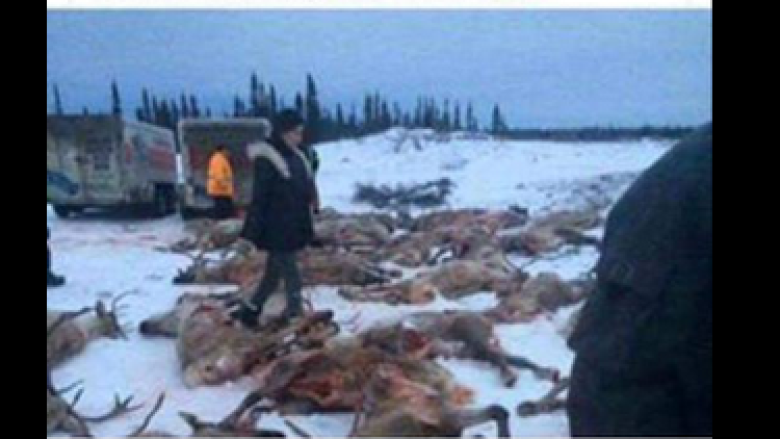Cree outraged over 'disturbing' caribou hunt despite changes to this year's rules
Photos on social media of dozens of dead caribou on the Transtaiga Highway near Chisasibi, in Northern Quebec, have yet again provoked outrage among Cree leaders, hunters and environmentalists who say whoever hunted these animals took too many and did not obtain proper permission despite new rules designed to protect them.
The rules governing the Dec. 1 to Jan. 31 sports hunt — which apply to anyone who is not a beneficiary of the James Bay and Northern Quebec Agreement, including hunters from the Innu or other First Nations — changed this year in an effort to curb meat wastage, reduce the number of hunters visiting the territory, and protect the Leaf River caribou herd.
The herd's population shrunk about seven per cent between 2014 and 2015.
Meat wastage rampant, says wildlife administrator
"We see whole caribou carcasses left on the side of the road, a lot of guts lying along the side of the roads or near camps," said Nadia Saganash, wildlife management administrator with the Cree Nation Government, describing some of the photos she receives every year.
"We've seen security issues as well, pictures of camps with bullet holes in them."
Saganash says some hunters don't realize the territory is inhabited, and don't hunt respectfully.
After photos circulated on Facebook of unidentified people standing amid 60 dead caribou, Chisasibi's band councillors took up the issue at their meeting this week.
"They don't even ask for permission anymore. They just come here, take what they can, and leave," said Chisasibi Chief Davey Bobbish.
"As First Nations we have to be careful. We have to be mindful of the wildlife and take care of it. What we've been seeing the last week or so is really disturbing."
New rules, mixed results
This year, Zone 22A (see map) has been closed entirely to non-beneficiary hunters. In addition, hunters are required to register their animals whole or in quarters with head and limbs attached, to discourage hunters from dumping unwanted parts.
In previous years two caribou were allowed per permit, whereas this year it's one per permit but hunters may obtain two permits each. A buffer of two kilometres along either side of the Chisasibi road is off-limits for visiting hunters.
The JBNQA protects the hunting rights of the Cree, Inuit and Naskapi beneficiaries. However, the Innu also depend on the caribou which have been less plentiful in recent years in Innu territories.
"The caribou is a resource that's important to many Aboriginal nations," said Saganash. "But we have the JBNQA framework which makes the situation awkward and difficult to deal with.
"On the one hand we want to respect the JBNQA but on the other hand we also want to respect our cultural ways which is to help our neighbours in need of this resource."
Many Innu no longer have access to caribou because they used to hunt from the George River herd which has has declined by 99 per cent since the early 1990s, according to the Quebec government.
The Leaf River herd, currently migrating through the James Bay region, numbered 332,000 animals in 2015, down almost seven per cent compared to the previous year. New data is expected to be released later this week from an aerial survey conducted in summer 2016.
We 'have to follow the teachings'
A handful of wildlife officers working for Quebec's ministry of Forests, Wildlife and Parks are responsible for a huge territory with few roads, making close surveillance difficult.
The caribou travel up to 6,000 km every year, migrating from their winter feeding grounds in the boreal forest to the tundra of Nunavik where their calves are born during the summer.
Chisasibi elder Samuel Bearskin remembers a time when caribou were scarce and his people were sometimes hungry.
"We as the Cree Nation have to follow the teachings that have been passed on to us," he said. "Where the animals, the fish, the birds are what we rely on for our survival. If only we were able to follow the rules of not wasting anything we harvest, we wouldn't have to be worrying about the animals being disrespected."



